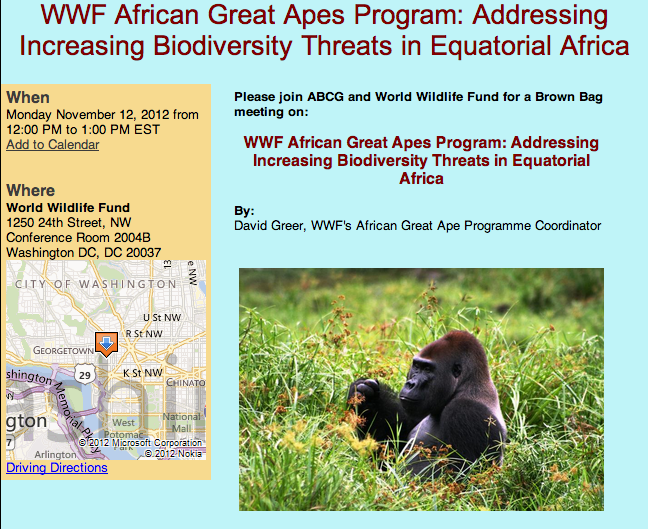Discussing Great Apes and Wildlife Crime at ABCG-WWF Event

Yesterday, I had the pleasure of attending the African Biodiversity Collaborative Group (ABCG) brown bag meeting on the World Wildlife Fund’s (WWF’s) African Great Apes Program—you can see that we love acronyms in conservation—on AWF’s behalf.
ABCG is a consortium comprising seven international conservation NGOs with field programs in Africa. AWF is a member of ABCG, and these brown bags provide us with the chance to exchange ideas and collaborate on critical issues.
During this event, David Greer, WWF’s African Great Ape Program coordinator, spoke about the increasing threats to great apes in Equatorial Africa and focused on solutions going forward. The discussion of great ape conservation feeds into the larger discussion of wildlife crime and trafficking.
I was disheartened to see, once again, gruesome images of mutilated apes and to hear about the lengths wildlife criminals are willing to go to make a profit off of these wonderful creatures. However, I was also uplifted by the presence of so many individuals, including students, who were willing to give up their lunch hour or come in on a day off so they could learn what they could do to combat these crimes.
Greer spoke about great ape trafficking and explained that much of the problem could be attributed to the prosecution stage. When wildlife criminals are apprehended, about 80 percent to 85 percent escape prosecution. Many of these criminals buy their way out of sentencing, or if they are sentenced, they receive extremely light sentences (sometimes as little as one month!). His solution to this growing problem is that we need to address the judicial level and work with legal authorities to enhance and enforce existing penalties. This is something AWF has been focused on. Earlier this month, AWF convened a judicial luncheon with Kenya Wildlife Service where Kenya’s top legal officials came together to discuss harsher penalties for wildlife-related crimes.
David’s presentation, and the discussion that followed, echoed the things that I have learned since starting work at AWF, much of what is currently being written about in the media, and even the speech Secretary Clinton gave last week. It was encouraging to see that we are all starting to be on the same page when discussing solutions to wildlife trafficking, and I am excited to follow the progress on this issue.
